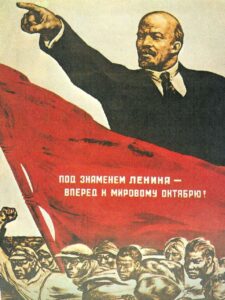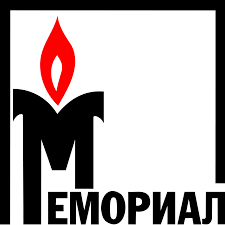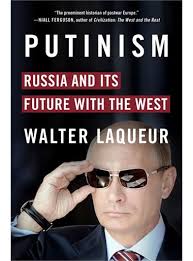
Screenshot History.com
Today many Russian democrats, desperate to get Vladimir Putin out of the Kremlin, find themselves voting for the Communists. They are well aware of the irony, the Economist reports:
But, as Yevgenia Albats, a firebrand of Russia’s opposition media, says, “this bitch of a government has left us no choice.” With nearly all forms of politics banned and [Alexei] Navalny behind bars, the Communist Party has become the main beneficiary of his “smart voting” strategy. He urged Russians to vote for whichever candidate was best placed to beat United Russia’s. Had the votes been counted honestly in parliamentary elections in September, the Communists would have got roughly the same number as United Russia. Even after all the rigging it won 19% of the vote, up from 13% in 2016.
The Communists’ current shift is largely a reaction to Mr Putin’s policies. By annexing Crimea in 2014 he stole the party’s previous nationalist agenda, leaving it to make a choice, sociologist Gregory Yudin tells the Economist. “They could either move further to the right and become extinct, or they could step out of their ghetto and shift to the left.”
President Biden has rightly diagnosed the key cleavage in global politics as between democrats and authoritarians, says Stanford’s Michael McFaul. But there needs to be more articulation that this is a war of ideas and greater direct support for Russia’s democrats, he tells CBS News.
In 1990s, Moscow’s famed Tverskaya Street embodied the fast-money excess of the post-Soviet free for all, the Post adds. In later years, it was packed with hopeful pro-democracy marchers. And now, under President Vladimir Putin, it is a symbol of his dreams of reviving Russia as a great power, reliving past glories and crushing any opposition to his rule. Join a tour here.
 The number of political prisoners in Russia has risen sharply this year in a trend that recalls late Soviet-era repression, said Russia’s leading rights group Memorial (right), the Moscow Times reports:
The number of political prisoners in Russia has risen sharply this year in a trend that recalls late Soviet-era repression, said Russia’s leading rights group Memorial (right), the Moscow Times reports:
It listed at least 420 political prisoners in Russia, including top Kremlin critic Alexei Navalny who survived a poisoning attempt with Novichok nerve agent last year. That figure was up from 362, the group told reporters and activists in Moscow after a year that has seen an unprecedented crackdown on critical voices, including Navalny, who in February was sentenced to two-and-a-half years in prison on old embezzlement charges.
Beginning in the fall of 2018, sociologists saw a sharp rise in social tensions in Russia, driven by price increases, unemployment and an economic crisis, Against the backdrop of ever harsher state repressions and restrictions on political activism (see EDM, July 9, 2021), this social stress has begun to manifest itself in irrational aggression, the growth of inter-ethnic conflicts, and even school shootings, notes analyst

Levada
And yet the authorities are responding to popular discontent in their usual way, she writes for Jamestown:
- First, the state is tightening its repression and control over the virtual space (see EDM, September 7), forcing the most politically active Russians to emigrate….
- Second, Russian propaganda is itself becoming more aggressive. Before, despite an abundance of militant statements, it was dominated by content aimed at discrediting the very understanding of objective truth. However, as demonstrated by data from the latest sociological poll, Russians are not inclined to fear “external enemies.” Quite the contrary, the respondents named the most acute problems as inflation (61 percent), poverty (36 percent), and corruption and bribery (33 percent) (Levada.ru, October 21).
- Third, the Russian authorities are trying to assert complete control over the regional elites. At the end of September, in the State Duma (lower chamber of the Russian parliament), lawmakers introduced a bill that removes the two-term restriction on governors, allowing the loyal heads of Russian federal subjects to remain in power indefinitely…
 Vladimir Putin’s speech to this year’s Valdai Forum, likening the enforcers of wokeness culture to the Bolsheviks and praising Russia for its “healthy conservatism,” seemed designed to appeal to foreigners who view Russia as a bastion of traditional values amid a sea of Western immorality, Georgetown University’s Angela Stent writes for Russia Matters:
Vladimir Putin’s speech to this year’s Valdai Forum, likening the enforcers of wokeness culture to the Bolsheviks and praising Russia for its “healthy conservatism,” seemed designed to appeal to foreigners who view Russia as a bastion of traditional values amid a sea of Western immorality, Georgetown University’s Angela Stent writes for Russia Matters:
He attacked feminism, the transgender community, affirmative action, “cancel culture” and “reverse racism,” quoting Rev. Martin Luther King Jr. to support his arguments. He claimed that the Western obsession with gender and race is “even worse than the agitprop department of the Central Committee” of the Soviet Communist Party. He said that his intellectual mentors were Nikolai Berdyayev and Ivan Ilyin—conservative philosophers who were expelled from their homeland after the Bolsheviks took over.
Several years ago, the historian Walter Laqueur suggested in his book “Putinism” that the Russian leader could be understood by looking at the history of ideas, notably Alexander Dugin and Ivan Ilyin.
Lenin would be baffled – Russia’s once-tame Communist Party is becoming an opposition force https://t.co/9eXfKYM2JW
— Democracy Digest (@demdigest) October 28, 2021







